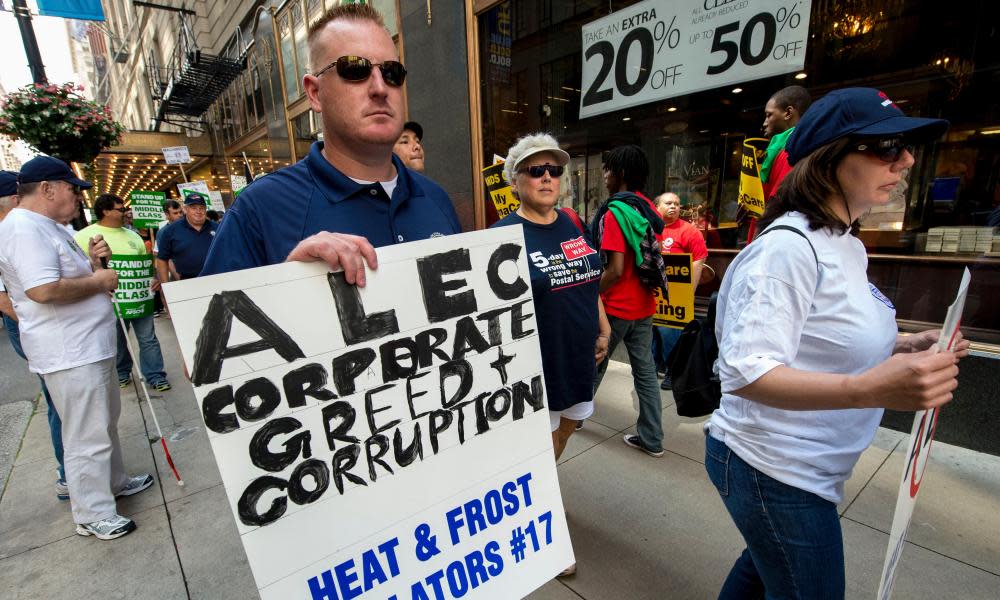Lawsuit could force secretive network promoting rightwing laws into the open

Alec, the secretive “bill mill” responsible for spreading rightwing legislation across the US, is facing a legal challenge to force it to open up to public scrutiny in a test case that could threaten the existence of the controversial network.
A lawsuit filed on Wednesday in a superior court in Maricopa county, Arizona, questions the way that local state legislators are allowed to participate in Alec events. The filing is timed to mark the opening of Alec’s annual summit in Scottsdale, Arizona, in which elected lawmakers will be teaming up with corporate lobbyists to frame business-friendly legislation in sessions closed to the general public.
Related: Rightwing ‘bill mill’ accused of sowing racist and white supremacist policies
The suit argues that Alec – renowned for propagating virulent rightwing laws that attack unions, immigrants and protest groups among others – undermines democracy by replacing the allegiance of legislators to voters with allegiance to big business. It states: “Members of the Arizona public are precluded from presenting their views and interests in a critical stage of the legislative process, addressing policy implications, or otherwise engaging in a robust discussion necessary to the democratic process.”
The suit seeks to leverage Arizona’s “open meetings” law which requires all public bodies in the state to make their events accessible to citizens. Arizona state and the Arizona state legislature are defendants in the case.
The plaintiffs, drawn from a number of local residents and advocacy organisations including the Latino group Puente, argue that Arizona legislators who attend the Alec summit do so in violation of the open meetings law. They point out that the rules apply to all gatherings where a quorum of public officials is present and where “they discuss, propose, or take legal action”.
Alec’s States & Nation Policy Summit opened on Wednesday at a resort in Scottsdale. Its key discussions will be held in private.
The summit was expected to be attended by hundreds of largely Republican state lawmakers from around the country and scores of corporate lobbyists. Together, behind closed doors, they will devise new legislation that will in turn be framed into Alec model bills and disseminated to state houses from coast to coast.
“This is a pay to play scheme in which Alec provides exclusive access to paying corporations and conservative activists. Over decades, they have used this secret approach to lawmaking to advance corporate interests in ways that have a real-world impact that harms citizens, particularly people of color,” said Dominic Renfrey of the Center for Constitutional Rights, attorneys for the plaintiffs.
David Armiak, research director with the Center for Media and Democracy which monitors Alec, told the Guardian: “Twice a year Alec provides a venue for corporate lobbyists to gain the undivided attention of state legislators. Corporations pay to play, getting access to lawmakers whereas those of us who vote don’t enjoy the same opportunity.”
The lawsuit complains that Alec’s membership is “intentionally hidden from the public”. As a result it is difficult to know how many legislators take part, though Alec claims it may be approaching a quarter of the total number of state lawmakers in the nation.
Reports suggest that more than 1,000 bills based on Alec templates are introduced into state assemblies each year with more than 100 passing into law.
The consequences of Alec’s approach is especially sensitive in Arizona. Ten years ago, at an equivalent Alec States & Nation summit in Washington, a draft model bill was presented by a then Arizona state senator, Russell Pearce.
The bill went on to be enacted in Arizona as SB 1070, the most brutal anti-immigrant law in the US at that time. Parts of SB 1070 are still in force today, notably the “show me your papers” provision that empowers law enforcers to demand proof of immigration status at every interaction with local people.
One of the plaintiffs in the new lawsuit, Jacinta Gonzalez of the Latinx advocacy group Mijente, said that SB 1070 illustrated the danger posed by Alec. “Our communities are facing the brunt of policies that are being passed not because they are promoting public safety but because they line the pockets of corporations.”
A leaked list of attendees at the most recent Alec conference in Austin, Texas, in August showed that the gathering included 29 Arizona state lawmakers, among them the speaker of the house and president of the senate. That is almost a third of the total of lawmakers in the legislature.
The lawsuit makes the assumption that at least 29 Arizona lawmakers will similarly attend this week’s Alec summit, given that it takes place in their home state. The plaintiffs argue that would mean that the quorum of at least five Arizona house and senate committees would be present at the Scottsdale event and should therefore be subject to the open meetings law.

